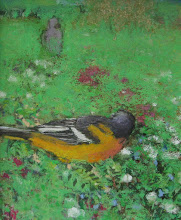Here is an a-musing poem from the 16th century in Wales, a time and place where tree religion was losing out and where the English were cutting down the Welsh woods for charcoal-burning. Robin Clidro is the poet, said to be a native of the Clwyd Valley, who wandered around South Wales until he was killed by a highwayman.
Marchand Wood
Odious and hard is the law
and painful to little squirrels.
They go the whole way to London
with their cry and their matron before them.
This red squirrel was splendid,
soft-bellied and able to read;
she conversed with the Council
and made a great matter of it.
When the Book was put under her hand
in the faith that this would shame her,
she spoke thus to the bailiff,
'Sir Bribem, you're a deep one!'
Then on her oath she said,
'All Rhuthyn's woods are ravaged;
my house and barn were taken
one dark night, and all my nuts.
The squirrels all are calling
for the trees; they fear the dog.
Up there remains of the hill wood
only grey ash of oak trees;
there's not a stump unstolen
nor a crow's nest left in our land.
The owls are always hooting
for trees; they send the children mad.
The poor owl catches cold,
left cold without her hollow trunk.
Woe to the goats, without trees or hazels,
and to the sow-keeper and piglets!
Pity an old red-bellied sow
on Sunday, in her search for an acorn.
The chair of the wild cats,
I know where that was burnt.
Goodbye hedgehog! No cow-collar
nor pig-trough will come from here any more.
If a plucked goose is to be roasted,
it must be with bracken from Rhodwydd Gap.
No pot will come to bubbling,
no beer will boil without small twigs;
and if peat comes from the mountain
in the rain, it's cold and dear.
Colds will exhaust the housemaid,
with cold feet and a dripping nose.
There's no hollow trunk or branch,
nor a fence for the beating of an old thin snipe.
Yes, Angharad spoke the truth,
if we don't get coal it's goodbye to our land.'
The translation is by Gwyn Williams, and appears in his book WELSH POEMS Sixth Century to 1600. Nearly every year I look to see and read this poem again, usually around the time of our first snowfalls. M and I happen to have plenty of squirrels and big old oak trees in our yard; still, the bard's exchange of his voice into the voice of a matron red squirrel impresses me the most! By the way, Gwyn Williams tells us that according to pre-Christian Greek travellers to Britain, the word bardd, still the Welsh word for a poet, was in use at the beginning of the first century B.C.































